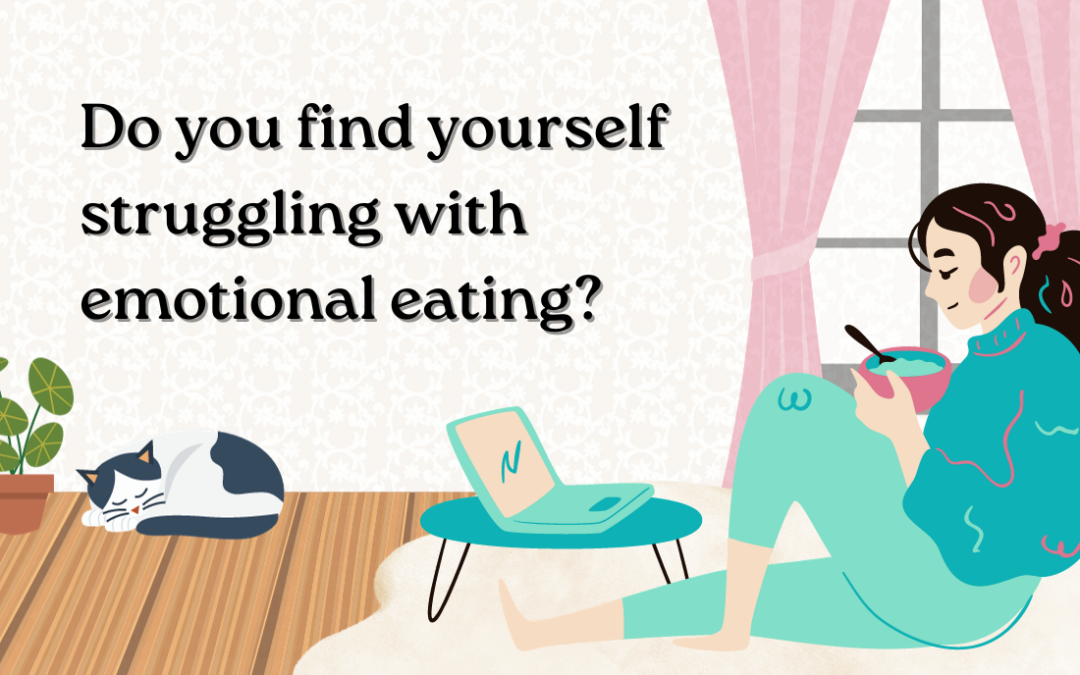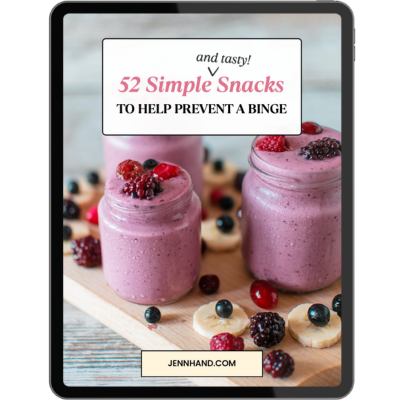Written by Jenn Hand, Holistic Nutritionist, Board Certified Health Coach, NBC-HWC
“I need to know how to deal with emotional eating!”
The key to dealing with emotional eating is taking a holistic approach.
Because emotions and food are complex, taking into account the physical, mental, emotional and spiritual aspects of emotional eating are the way to break free from turning to food when life gets hard.
Ignoring one of these pillars (which means ignoring a part of you!) can halt progress on this path.
Things you can do to deal with emotional eating include working with a coach, balancing your blood sugar, uncovering why you eat emotionally, identifying and planning for triggers, practicing mindful eating, and letting go of the shame and guilt around food.
This is just the tip of the iceberg.
There’s so much you can do to move through and release emotional eating. It’s not something you have to live with forever. I promise!
But it is a big topic. So keep reading to hear more about my personal journey with emotional eating as well as how I’ve helped thousands of women deal with their emotional eating and heal from the inside out.
Table of Contents
- How to Get Help with Emotional Eating
- What Exactly Is Emotional Eating?
- Stress Eating vs. Emotional Eating
- Ready to Stop Emotional Eating?
- 6 Healthy Food and Mindset Habits
- The Typical Emotional Eating Cycle
- Top Causes of Emotional Eating
- How to Identify Your Emotional Eating Triggers
- I Was an Emotional Eater: Here’s What I Did
- Eating Habits and Emotional Eating
- How to Assess Physical and Emotional Hunger
- Weight Loss and Emotional Eating
- Why Restrictive Food Rules Don’t Always Solve Emotional Eating
- How to Deal with the Desire for Comfort Food
- Should You Try to Control Emotional Eating? Or Is Control the Wrong Word for It?
- Mental Health and Resilience Blossoms When You Overcome Emotional Eating
- Should You Work with an Emotional Eating Coach?
- Common Questions about How to Deal with Emotional Eating and Get Help
How to Get Help with Emotional Eating
When it feels like emotional eating becomes a bigger issue, and you aren’t sure how to deal with the hard things life throws your way, it may be beneficial to get help. Typically, those of us who struggle to know “what to do” when a feeling arises (besides eat!) didn’t learn how to process emotions and express feelings.
Seeking out a coach, a therapist or other 1:1 support can be a great resource to help you learn how to break free from emotional eating.
In my own work, women come to me for a variety of different reasons. Some want to lose weight and realize their stress eating every night is keeping them stuck. Others have had significant loss or heartache (a parent passed away, they got divorced, a crushing career setback, etc) and can’t seem to stop eating over the feelings, even though they know they “shouldn’t.”
Other women have had their doctors tell them they need to lose weight, don’t want to diet, and understand that they use food in a way that’s not serving them. Women come to me for all sorts of reasons, but the one common thread is this: they struggle to deal with the ups and downs of life without eating.
As you’re exploring emotional eating and it’s impact on your life, here is a gentle, loving reminder:
There is nothing “wrong” with you for eating emotionally. It’s something we learned growing up when we didn’t have other coping mechanisms and it’s something we can unlearn too 🙂
A study in a medical journal found that more than 40% of people with obesity display emotional eating behavior, so it is a common struggle in our society. The good news is that there is support out there for you if you struggle!
Types of Coaches and Therapists that Can Help You With Emotional Eating
FOOD COACH
A food coach can actually be a mix of different things depending on the person! I used to use this as a term for myself because I help people learn to eat “normally” but others use it to mean a focus on specific nutrition and diets. Do your research if you come across a food coach to see what their background and qualifications are to see if they are someone you resonate with!
EMOTIONAL EATING COACH or BINGE EATING COACH
An emotional eating coach or binge eating coach is someone who specializes in helping those who struggle to feel their feelings without food or those who battle overeating. This is for someone who needs support in these specific areas or who feels deeply impacted by not being able to stop emotionally eating or bingeing.
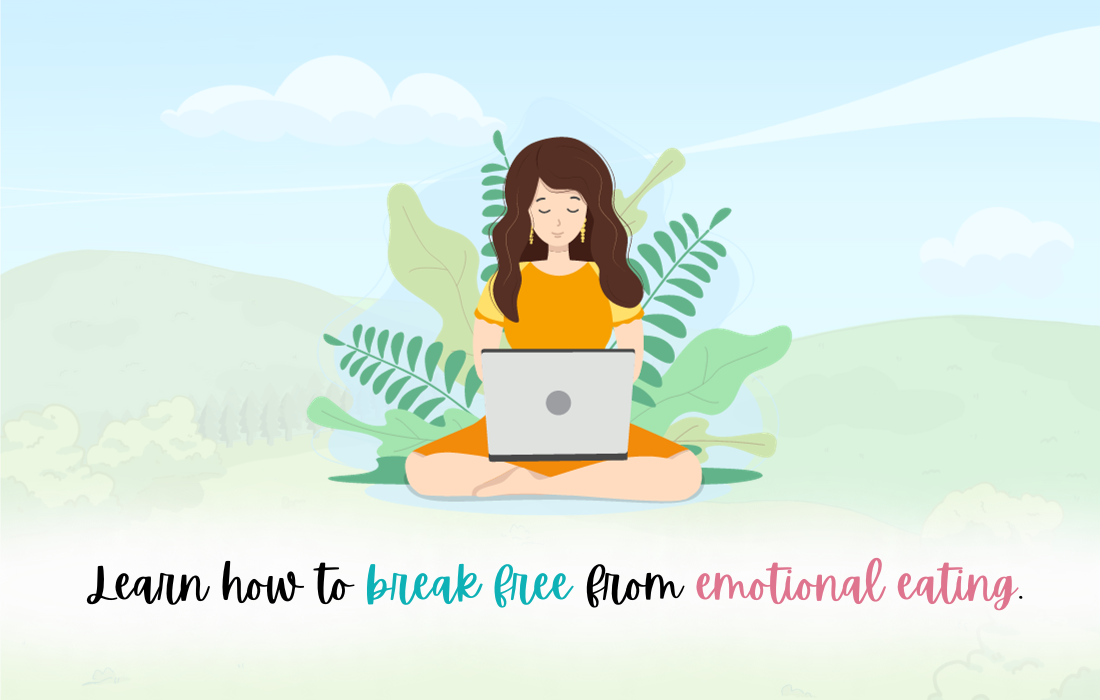
HOLISTIC NUTRITIONIST
A holistic nutritionist is someone who is trained to look at health from a whole body perspective. They don’t look at nutrition just physically, but they also consider the mental, emotional and spiritual aspects of food, as well. This is for those who want to specifically focus on nutrition and food, but in a more intuitive, compassionate way.
THERAPIST
A therapist is a mental health professional who diagnoses mental health issues and develops a treatment plan for their clients. There are a variety of different types of therapy modalities. This is for someone who struggles with longer term mental health issues.
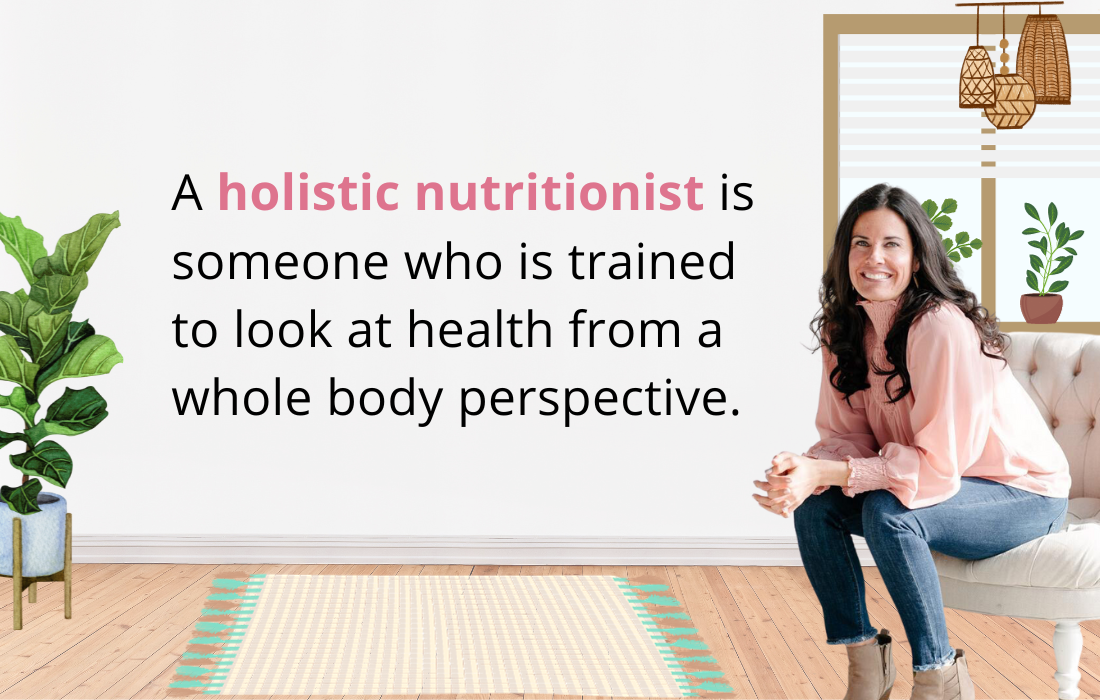
COUNSELOR
A counselor offers advice usually on a short term basis and helps those who struggle with a variety of life’s challenges. This is typically for someone who struggles with more generalized issues and wants help along the way.
HOLISTIC WEIGHT LOSS COACH
A holistic weight loss coach helps you take a whole person approach to rebalancing your weight. This is for anyone who is tired of dieting, can’t find long term “success” on a food plan, and who has struggled to maintain a comfortable body weight.
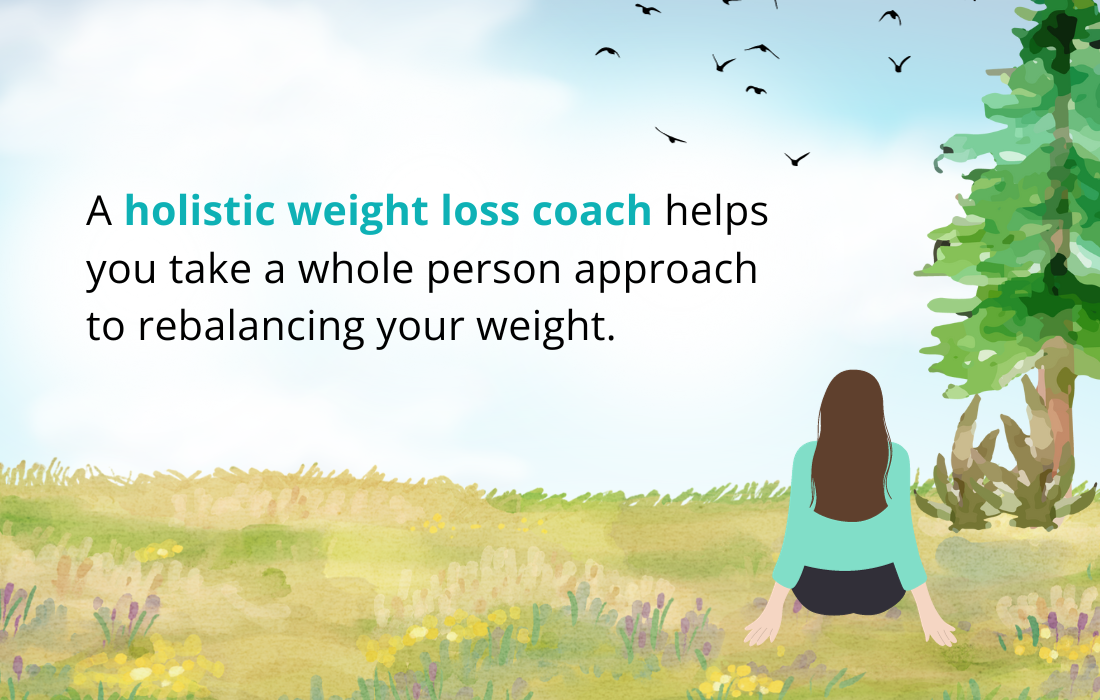
Questions to Ask a Coach on a 15-minute Discovery Call
- What has been your own personal experience with (insert issue you struggle with?)
- How have your clients been “successful” working with you?
- What does your process look like if I worked with you?
- What if I have doubts or fears around this process?
Zoom vs. In-Person: How to Decide
There are pros and cons to both virtual coaching sessions and in-person visits.
As tele-health has become more common over the last few years, more and more people are opting to take the virtual route. The choice is up to you! If you value convenience, flexibility, more options, and the ease of sitting at home for a coaching session, virtual may be the best option for you.
If you feel strongly about connecting face to face with someone, in-person may be a better fit.
I’ve done both personally over the years and see the value in both options. You can’t go wrong with either! Ask yourself what you value most and let that guide your decision to see what option works best for you and your lifestyle.

How to Decide What Type of Coach or Therapist will Be Best for You
Deciding to work with a coach or therapist is a big decision.
When I got support in my own journey, the woman I worked with was an incredible match for me (and ended up changing my whole life!) I’ve worked with other coaches over the years that haven’t felt as aligned with me and it’s made a difference in my own progress.
Here are some tips to help you decide on the right fit:
- Does this person listen? We always want to feel seen and heard, but it’s especially important in coaching or therapy! Get a sense of how you feel: do they really listen to you when you talk and hear what you’re saying?
- Know where you want support. If you are struggling with a specific issue, it can be beneficial to find someone who specializes in that issue and/or who has had personal experience overcoming that issue.
- Get a sense of your rapport. This will be someone you’ll share a lot of personal struggles with, so see if you feel a sense of rapport and ease with them. Do they make you feel at ease? Do you feel comfortable around them? That’s an important part of feeling like you can open up and share.
- Go with your gut! We all have an intuitive sense of a connection with someone when we meet them. How do you feel about working together? What does your intuition say? Go with that feeling!
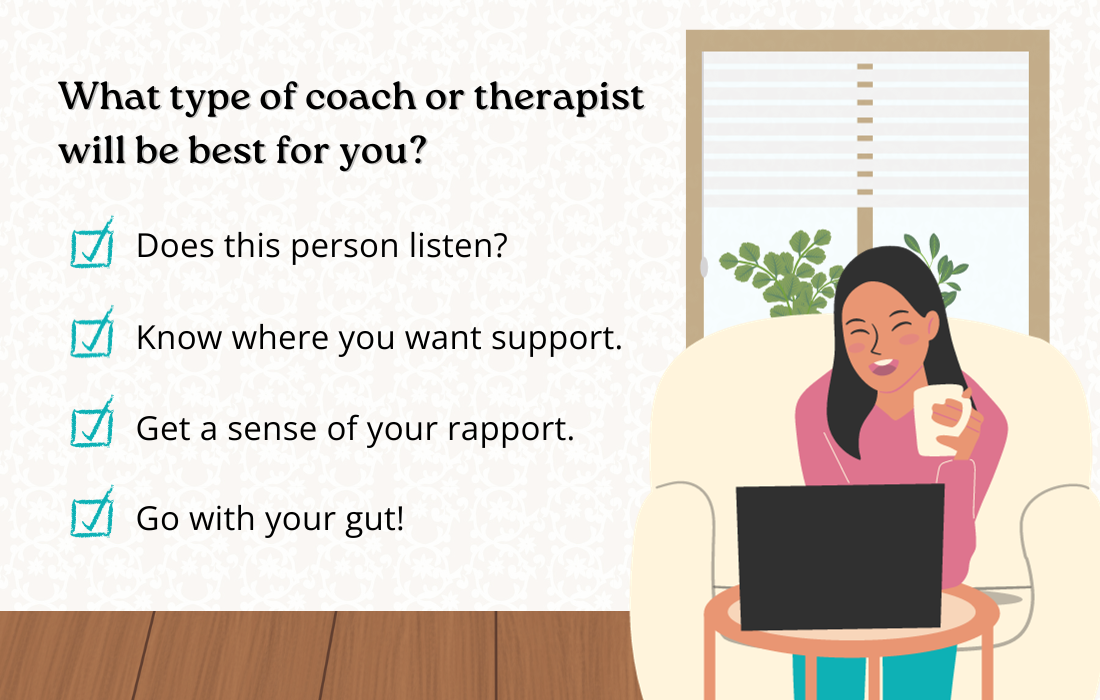
What Exactly Is Emotional Eating?
Emotional eating is using food to comfort yourself in times of overwhelm, to numb out from a painful feeling, to distract yourself from the stresses of life or to deal with boredom, loneliness, sadness or (insert other hard life emotions here!) It is common to turn to food when anxiety, uncertainty, fear or any other big emotion comes our way, especially if we didn’t learn what else to do besides eat.
Stress Eating vs. Emotional Eating
Stress eating and emotional eating have many similarities. Both use food to deal with something challenging in life.
Think of emotional eating as a broader umbrella term, with stress eating falling under that.
There are many types of emotional eating: boredom eating, overwhelm eating, etc. Since stress runs rampant in our society, stress eating has now become a well-known phrase.
To me, a large majority of the population occasionally stress eats–it’s human nature to sometimes reach for food! But when it becomes a larger issue and we eat for almost all emotions and don’t know how to handle them otherwise, that’s when it affects our day to day life.
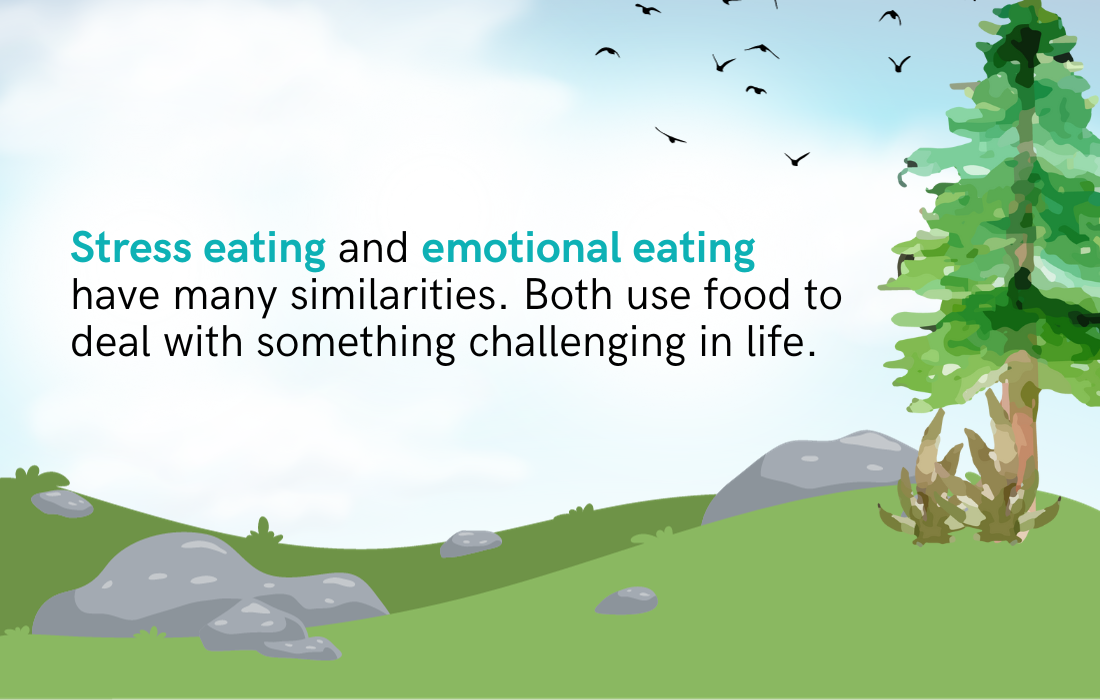
Ready to Stop Emotional Eating?
The first step to change any habit or pattern that no longer serves us is awareness.
So if you know that you struggle to cope with emotions, that’s a big step forward! That awareness is what allows you to be open to learn how to change. Let’s dive in!
6 Healthy Food and Mindset Habits
1. Staying Aware of What’s Happening Within Yourself
See if you can explore what’s going on inside while you eat or when you’re choosing what to eat.
Are you anxious or afraid? Do you have a food battle raging in your mind? Is there guilt present? Are you in a hurry? Get curious and explore what comes up; this curiosity can help you start to be familiar with your internal emotional landscape.
2. Maintaining a Food Diary to Monitor Eating Patterns
Some people find a food journal immensely helpful, while others find it feels very “diet-y.”
The intention is not to weigh and measure food, but to write down what you’re eating (and how you’re feeling if you want to take it a step further!) to help you identify patterns. It can be useful to start to see where your challenging spots are in the day to then begin to address them.

3. Checking Your Hunger Level Before Eating
Many women have to re-learn how to hear hunger and fullness signals.
If we’ve followed a diet for any length of time, we usually don’t “check in” with our bodies on the diet. Paying attention to the signals our bodies give us is a big step to start to learn what our body is trying to tell us!
4. Seeking Support From Others
After working in this space for almost a decade, I can tell you for sure that you are not alone.
Many women struggle with emotional eating and most of us didn’t grow up learning how to process emotions! Seeking out support from a group, a book, a coach or any other way that feels nourishing is a great way to learn how to start feeling emotions without turning to food.
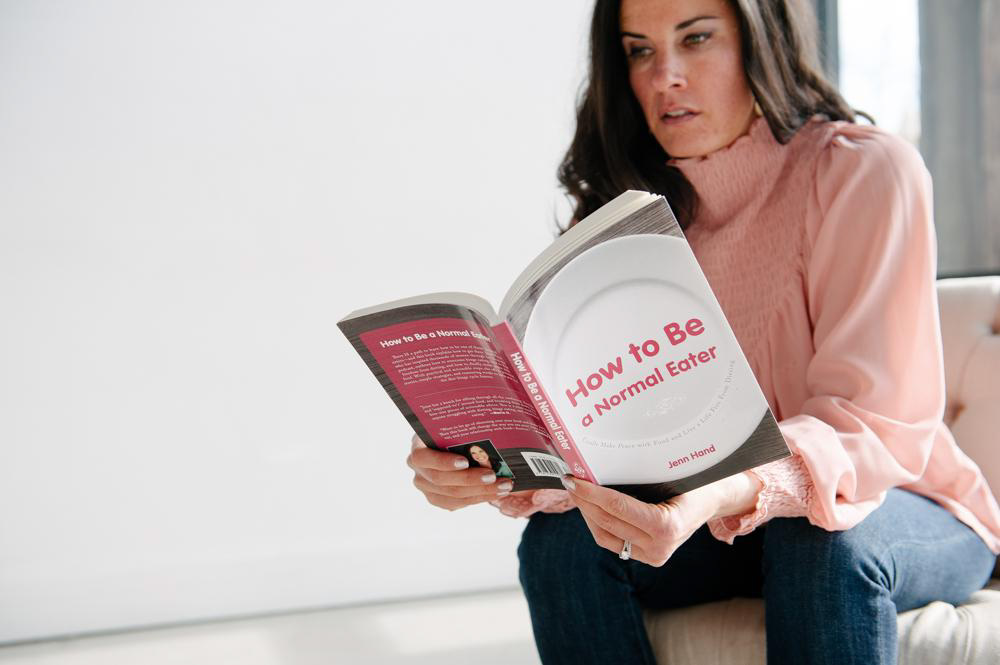
5. Practicing Mindful Eating
Slowing down can be immensely helpful when we’re working to find balance around food.
When we pay more attention, eat with fewer distractions, stay present with the experience of eating and slow down to enjoy our food, it changes our relationship to food in a positive way.
6. Being Kind to Yourself in the Process
Typically, if we struggle with emotional eating, it’s because we didn’t learn how to deal with our feelings when we grew up.
So as you’re learning the “language” of emotions and practicing how to deal with life without using food, be extra gentle with yourself! It can take time to learn to express emotions, feel feelings, and be in the discomfort of putting down the food.
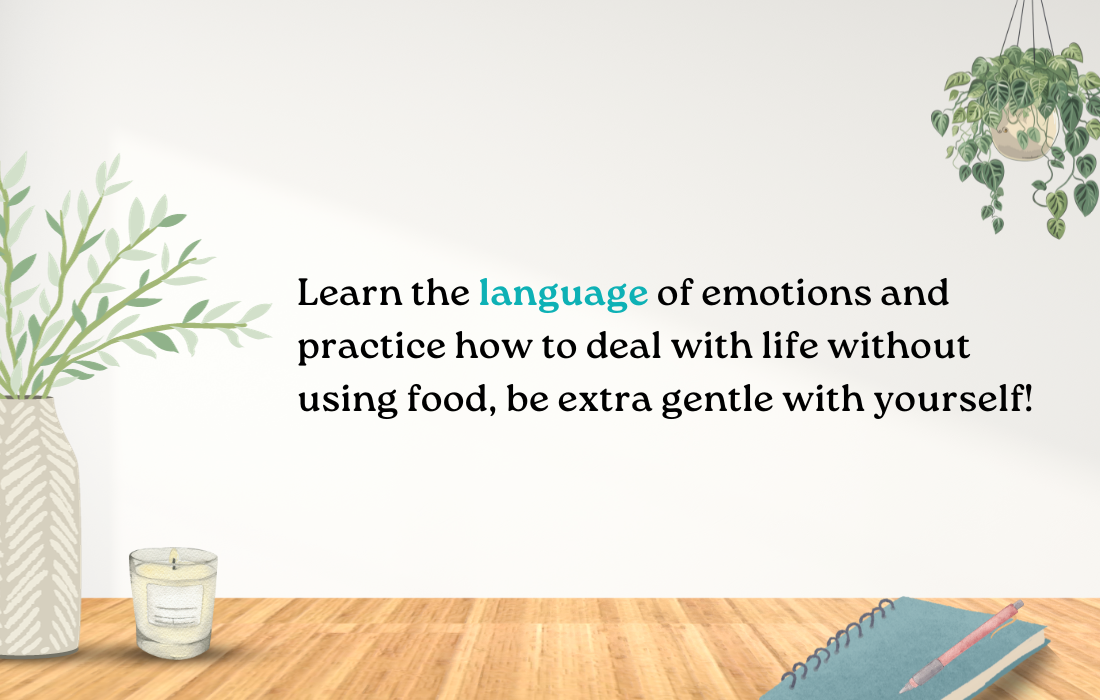
The Typical Emotional Eating Cycle
The cycle of emotional eating can vary depending on the person, but it usually goes something like this:
- You experience something challenging in life (a breakup, a career obstacle, an unhappy marriage, work stress, or overwhelm with daily to-dos)
- A strong emotion arises (sadness, frustration, hopelessness, overwhelm)
- You turn to food (for relief, comfort, ease, joy)
- You feel like a failure or blame yourself
- You promise yourself you won’t overeat again
- You experience something challenging in life (and the cycle repeats)
This cycle can cause us to feel a lot of blame and shame. For me, this wasn’t a conscious cycle at first.
I would just eat over everything and it wasn’t until I gained awareness around what I was doing that I was able to change. So if you recognize this pattern in yourself, that means you are already open to learning how to heal!
Top Causes of Emotional Eating
For most women, the biggest drivers to turn to food are:
- Rewarding yourself after a long day
- Relief from overwhelm around too many to-do’s
- A way to deal with loneliness and disconnection
- A distraction from boredom and “not knowing what to do with myself”
- Soothe fears around uncertainty

How to Identify Your Emotional Eating Triggers
It can be very helpful to write down the times you overeat during the day and whether or not they were related to something you were feeling.
Journaling is a great way to identify your triggers. Use the following questions for journal reflection:
- Is there a certain person that drives me to eat?
- What time of day is most challenging for me around food?
- Where do I eat over stress or overwhelm?
- When I overeat, is it because I was really bothered about something I didn’t know how to address?
I Was an Emotional Eater: Here’s What I Did
Healing emotional eating was key for me in being a “normal” eater, being comfortable in my body and having my weight stabilize.
I used to eat over everything: happiness, sadness, angst, anxiety, feeling left out, feeling like I didn’t fit in, uncertainty and every other feeling I felt.
I felt a deep discomfort in myself: I didn’t know how to handle the ups and downs of life. Food became my comfort, my healing balm, and my companion on this roller coaster ride of life.
The problem was that I didn’t WANT to live this way. When I began getting help, I realized I didn’t know how to feel. I stuffed everything inside and was terrified of emotions. Would it be too intense? Was I capable of feeling? Would my emotions swallow me whole? Would I be “too much” if I let myself be emotional? There were so many fears swirling inside me. But over time, I slowly dipped my toes in the water in “feeling” and learning to express.
It was messy at first–I tried to share sadness or tell someone I was angry and it came out awkward and weird.
I set timers to give myself a boundary around feeling. I told myself that I could feel anything for 10 minutes and then if I wanted to still eat, I could. But what usually happened was that the emotion would calm down and move through, and I would gain confidence that I COULD keep learning how to feel rather than eat.
Over time, using my journal, tears as an emotional release, getting 1:1 support, experimenting with different emotional tools like tapping, I learned how to process and express emotions. There are still times when I hit an emotional edge, and think “man, I WISH a bowl of ice cream would take this away,” but I know that other tools are really what would best serve and nourish me.
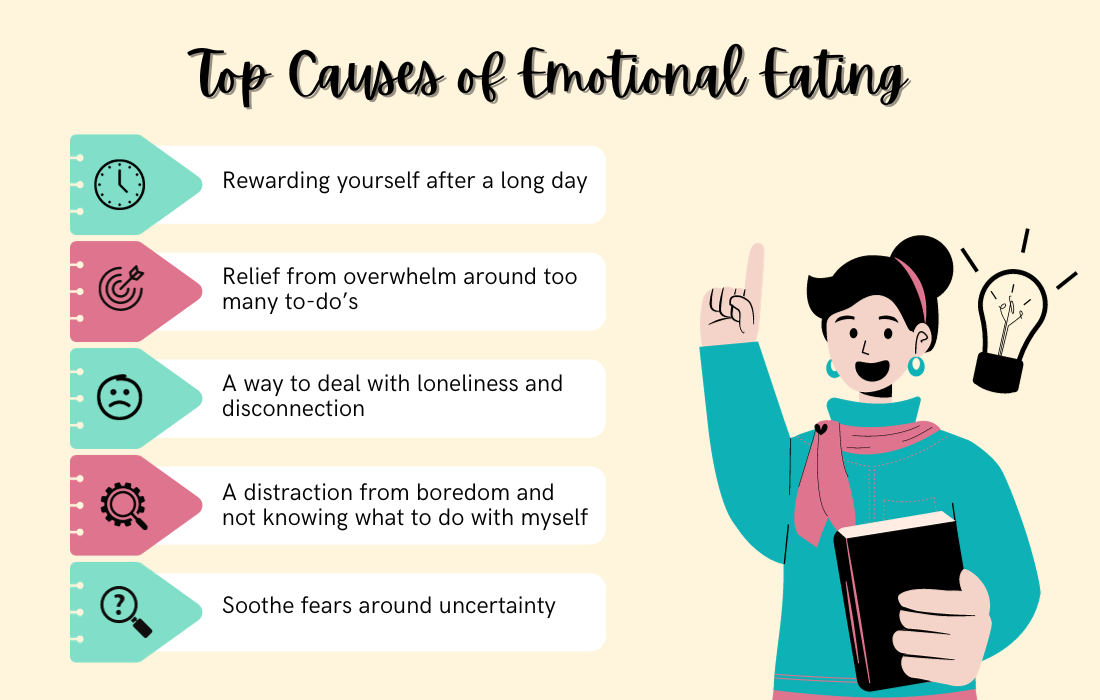
Eating Habits and Emotional Eating
There are two physiological habits that help keep your blood sugar even, which in turn enables you to make more conscious decisions around food:
1. Keeping your body fueled throughout the day: Make sure you don’t go too long without eating! When you eat regularly and often, you keep your blood sugar steady and even. This helps you rely less on willpower and enables you to make conscious choices.
2. Eating protein every time you eat: This allows the body to digest food more slowly, so your blood sugar doesn’t spike and crash. It’s helpful to cut down on sugar cravings!
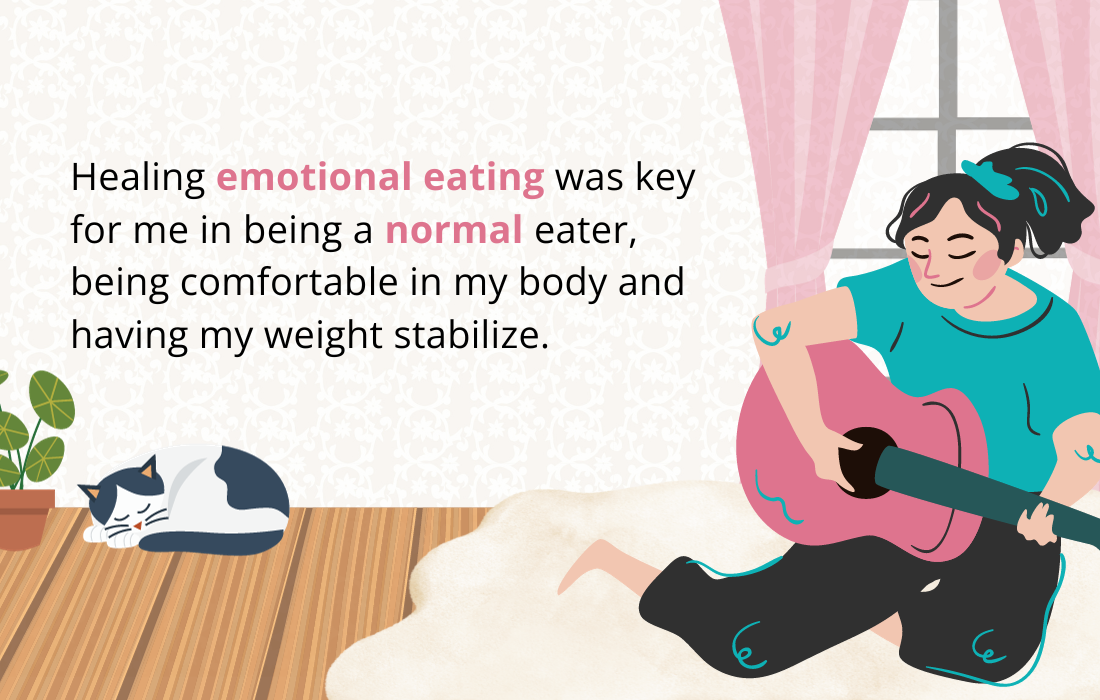
How to Assess Physical and Emotional Hunger
PHYSICAL HUNGER:
Physical hunger is a biological need for fuel that the body requires to sustain its bodily functions.
EMOTIONAL HUNGER:
Emotional hunger is a psychological desire to help deal with a feeling that typically leaves us wanting more.
Weight Loss and Emotional Eating
One of the biggest components missing in any weight loss journey is the emotional aspect.
Weight is a complex issue, and many times we end a diet and think “well, now what?!” How do we eat if we didn’t address any of the underlying issues of why we use food? Addressing emotional eating typically impacts your weight loss journey in a very big way, as it gets to the heart of many of the struggles to lose weight.
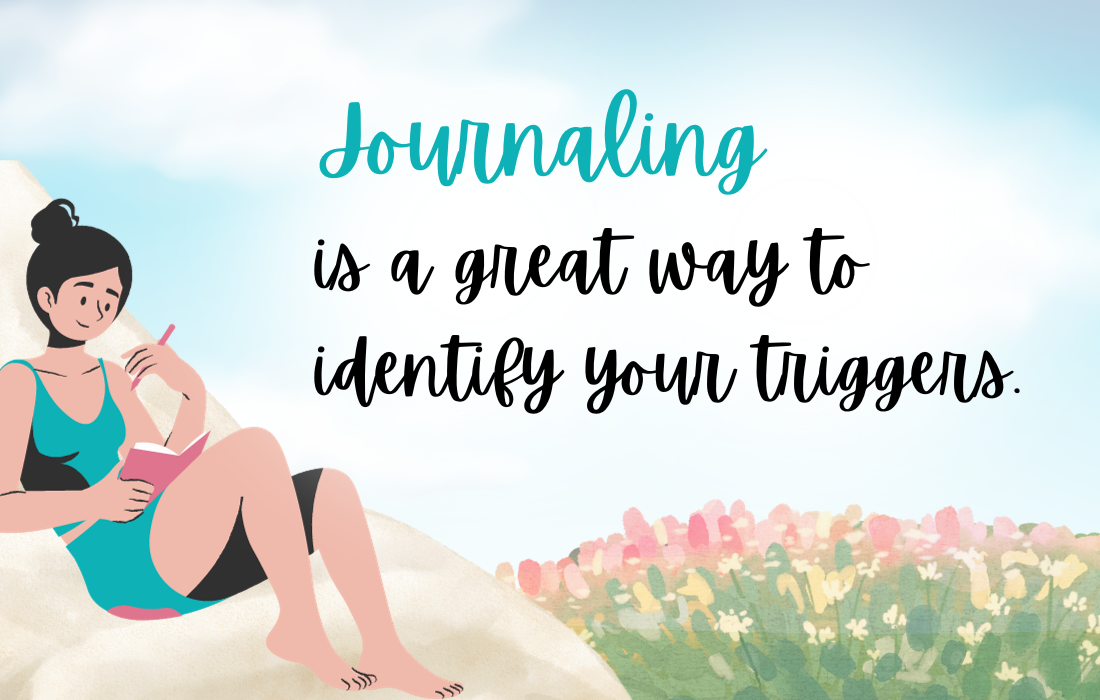
Why Restrictive Food Rules Don’t Always Solve Emotional Eating
When we create more rules around food, it usually backfires and we end up rebelling against it or not being able to follow the strict regime. We don’t need more rigid rules to reign ourselves in, what we need is to gently learn how to handle the challenging things that life throws our way.
How to Deal with the Desire for Comfort Food
One helpful tip is to journal about what ELSE brings you comfort besides food.
It’s not about making a rule that we never eat again, it’s about learning how to get our needs met in other ways besides food. We explore how to comfort ourselves in order to let go of the need for food to fulfill that need.
Brainstorm ways to find comfort (talking to a friend, curling up with a pet, a good cry, journaling, meditation, a creative outlet, or any other idea you have!) and experiment with how these impact you on your emotional journey.
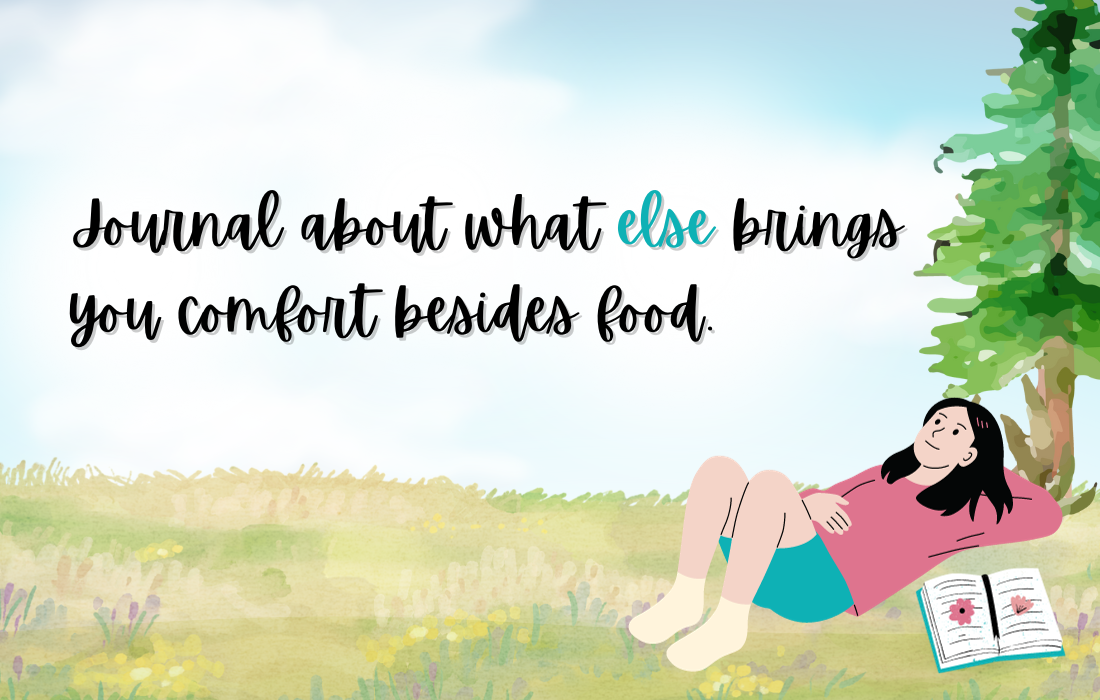
Should You Try to Control Emotional Eating? Or Is Control the Wrong Word for It?
As a recovering control freak, I wanted to control everything in this food journey!
The reality is that it’s not about controlling our food, it’s about learning to trust ourselves around it. When we find more balance, learn how to deal with emotions, and trust our bodies in how to eat, we naturally feel in “control” (except I like to call it balance!)
Mental Health and Resilience Blossoms When You Overcome Emotional Eating
Overcoming emotional eating enables you to deal with whatever life throws your way.
You become more resilient and mentally/emotionally balanced because you trust yourself not to eat when life gets hard.
Should You Work with an Emotional Eating Coach?
If you feel like emotional eating is significantly impacting your life, it may be helpful to hire a coach.
If you’re thinking about it, I always like to say to get quiet and still and see what your intuition is telling you. If you feel drawn to it (a little bit of fear is normal!) then it may be a sign that this is the next step in your journey.
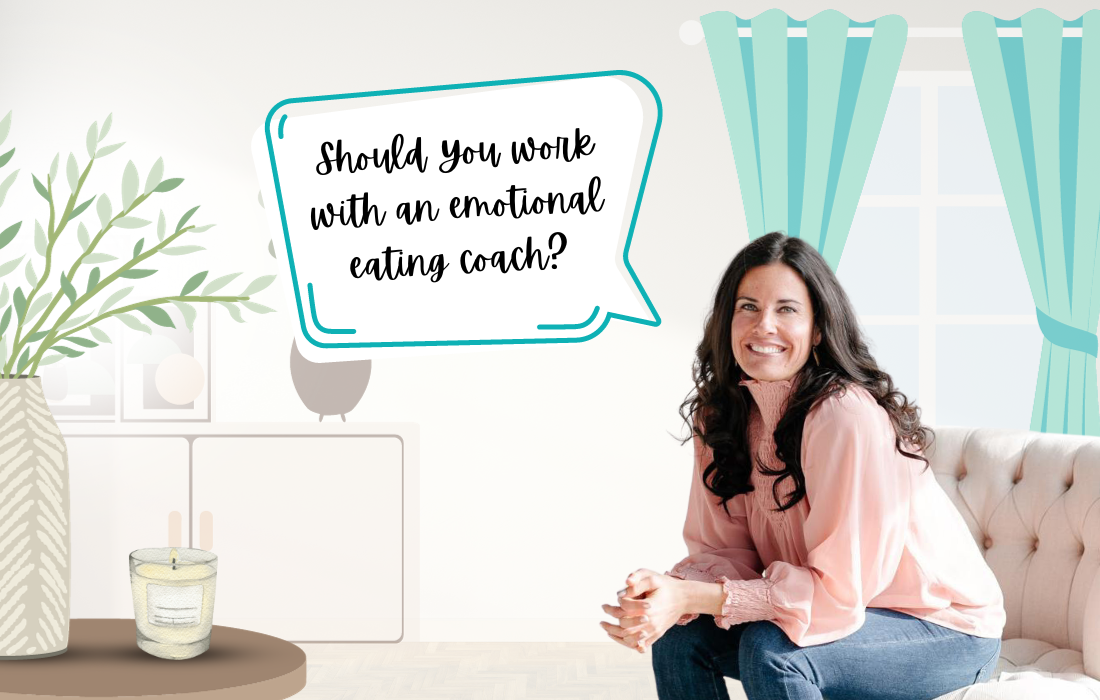
Common Questions about How to Deal with Emotional Eating and Get Help
How do I stop eating to fill my emotional void?
Learning to fill the emotional void can be a complex process of establishing a connection within. I have a course that addresses that exact process.
Is eating comfort food bad?
Occasionally, everyone eats for an emotional reason! It’s only when it becomes a regular occurrence that it may require additional support to work through.
Are there emotional eating types?
You can break it up into types (some people eat for reward and others eat to ease loneliness), but I have found that most people eat over many emotions.
What should I do about food cravings?
One of the first things to do for cravings is to not resist it! The more we fight it, the more we give in. Instead get curious about what is going on and why you are craving something.
How can I tell if I’m physically hungry vs. craving food emotionally?
Physical hunger is a physiological signal from the body that can include a stomach grumble, low energy, lightheadedness or other physical signs. An emotional craving is more of a grasping, desire to “fix” something that is hard to deal with.
More Articles About Emotional Eating:
⚪ Best Books on Emotional Eating
⚪ Work with an Emotional Eating Coach
Get the Normal Eater’s Newsletter
Join 8000+ women who are overcoming overeating, binge eating, and breaking up with dieting forever. Get Jenn’s inspiring and actionable weekly newsletter with the latest posts, podcasts, and tips on how to love your body, find food freedom, and lose weight holistically.
Get the Normal Eater’s Newsletter
Work with an Emotional Eating & Holistic Nutrition Coach
Overcome Bingeing and Emotional Eating, and Break Up with Yo-yo Dieting
Working with an emotional eating coach and holistic nutritionist can help you get free from the frustrating binge and restrict cycle and stop yo-yo dieting.
You don’t have to be obsessed with food or have a million rules around eating to find your natural weight and learn to love your body. Ready to actually see a lasting change and experience true freedom?
Schedule a 20-min CallAbout the Author:
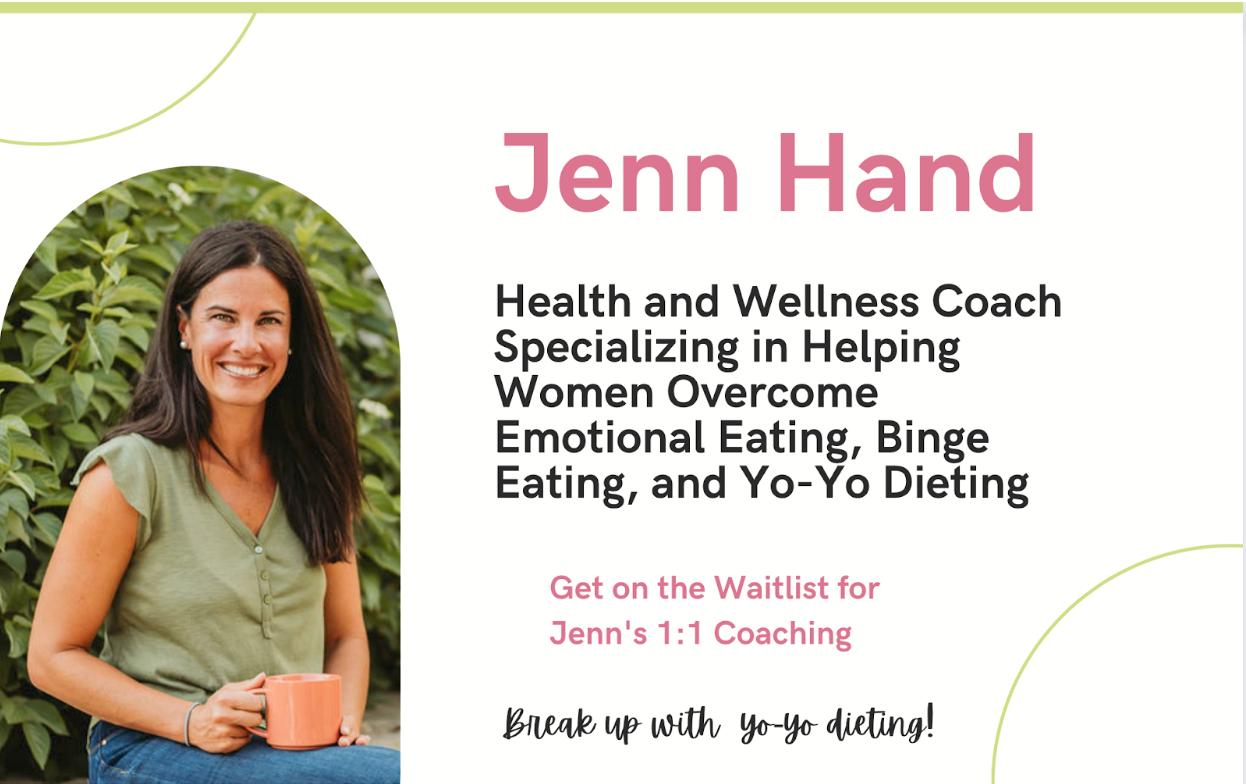
Jenn Hand has been helping women like you become normal eaters since 2015.
She’s worked with thousands of women, helping them to balance their bodies, end bingeing, stop obsessing over food, and start feeling amazing again. As a board-certified health coach and holistic nutritionist, Jenn knows how to support you in making real positive changes that last.
Her articles have been published on Mind Body Green, Tiny Buddha, Thrive Global and other local and global media platforms. She’s the author of How to Be a Normal Eater and the creator of The Normal Eater’s Club program. Listen to Jenn’s advice and tips on the Cake Doesn’t Count Podcast, or read more of her articles for free on the Food Freedom Blog.
Learn About Coaching!
